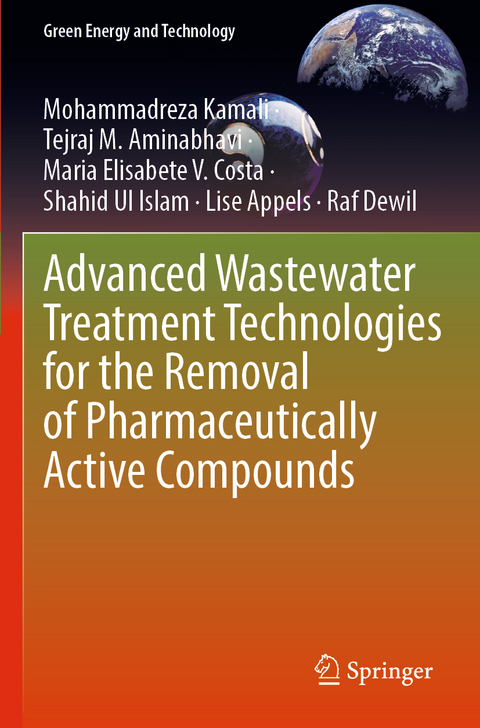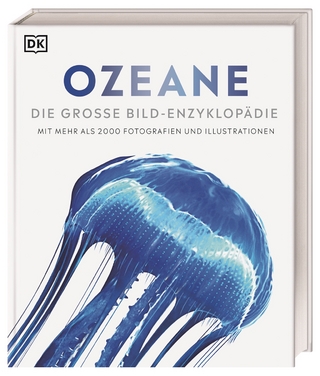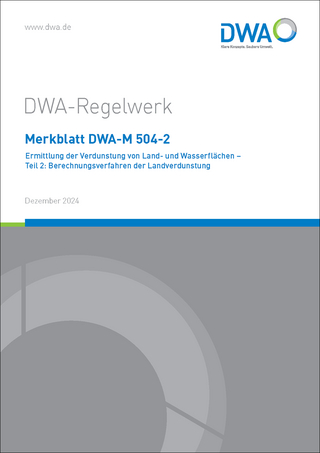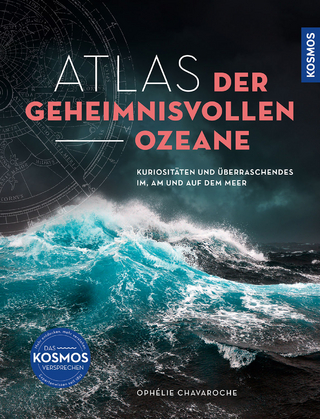
Advanced Wastewater Treatment Technologies for the Removal of Pharmaceutically Active Compounds
Springer International Publishing (Verlag)
978-3-031-20808-9 (ISBN)
This book reports on the treatment of waters and wastewaters with contaminants of emerging concern such as pharmaceutically active compounds. It shows how to prevent the contamination of the environment with such pollutants in the content of effluents. This book reviews various physico-chemical and biological methods that have been developed in order to deal with the polluted effluents. It also evaluates the already developed technologies regarding the sustainability criteria. The chapters discuss technical aspects and put the spotlight on the sustainability aspects of the water and wastewater treatment technologies.
Mohammadreza Kamali is a research and teaching academic staff at Process and Environmental Technology Lab (PETLab), Department of Chemical Engineering, KU Leuven, Belgium. He has over ten years of experience in the design, construction, and operation of large-scale wastewater treatment plants. He works mainly on developing novel (waste) water treatment technologies (especially using advanced and sustainable materials), waste valorization for environmental applications, and sustainability and life cycle assessment of advanced technologies.
Tejraj M. Aminabhavi is a director of Research at School of Advanced Sciences, KLE Technological University, Hubballi, India, and a diamond jubilee professor for life at Karnatak University, Dharwad, India, in addition to an honorary visiting professor at Macquaire University, Sydney, Australia. Aminabhavi obtained Ph.D. in polymer science from the University of Texas, Austin, Texas, USA; he has over 45 years of experience in academia, teaching, research, and industry. He works in the area of membrane transport processes, molecular modeling of polymer surfaces, wastewater treatment technologies, drug delivery polymers, and sustainable environmental engineering. Aminabhavi received Nikkei Asia Award in 2013 from Japan, Kwarizmi International Award from Iran in 2009, and CIPET Award in 2014 from ministry of fertilizers and chemicals, India.
Elisabete Costa is an assistant professor of the University of Aveiro (UA), Portugal, at the Department of Materials and Ceramic Engineering (DEMaC), and a researcher of CICECO, Aveiro Materials Institute. She has a Chemical Engineering degree (Coimbra University) and a Ph.D. in Materials Science and Engineering (UA). Her teaching activities have covered different engineering courses and the supervision of student's research projects and industry internships. She held several institutional coordination positions, among which a coordinator of DEMaC Scientific Council, a master in Materials Science and Engineering, and a director of Doctoral Program in Nanosciences and Nanotechnology. Her current R&D interests encompass a wide range of materials regarding composition, dimensionality, and properties, for different applications (electronics, biomedical, and environment), i.e., synthesis and processing of nanoparticles, nanostructures, thin/thick films, single crystals, ceramic bulk materials and ceramic polymer composites, and characterization of their structure, microstructure, mechanical, dielectric, piezoelectric, and ferroelectric properties.
Shahid-ul-Islam is a fulbright research scientist at the University of California (Davis), California, USA. Before joining UC, he was working as a principal scientist at the Indian Institute of Technology Delhi, India, where he led projects funded by the Science and Engineering Research Board (DST-SERB) and the Council of Scientific and Industrial Research (CSIR), Govt. of India. His research goals are interdisciplinary, with a main emphasis on green engineering, sustainable chemistry, and the design and development of biologically active materials and surfaces for different application sectors. He is a fellow of the International Society for Development and Sustainability (ISDS), Japan; a member of many groups, including the American Chemical Society (USA); and is a life member of the Asian Polymer Association.
Lise Appels is the head of the Process and Environmental Technology Lab (PETLab), which focusses on resource recovery and the treatment of aqueous waste and side streams. Within PETLab, she coordinates the research line on optimization of mixed-culture microbial processes toward the production of energy carriers and renewable chemicals, using (polluted) organic side streams as feedstock. She is a subject editor of Renewable Energy (IF= 8.001), EBM of various international journals (Renewable and Sustainable Energy
Pharmaceutically Active Compounds in Water Bodies - Occurrence, Fate, and Toxicity.- Techniques for the Detection, Quantifications, and Identification of Pharmaceutically Active Compounds and their Removal Mechanisms.- Removal of Pharmaceutically Active Compounds in Water Bodies - Science history and research hotspots.- Pharmaceutically Active Compounds in Activated Sludge Systems - Presence, Fate, and Removal Efficiency.- Pharmaceutically Active Compounds in Anaerobic Digestion Processes - Biodegradation and Fate.- Microbial Fuel Cells for the Bioelectricity Generation from Effluents Containing Pharmaceutically Active Compounds.- Constructed Wetlands for the Elimination of Pharmaceutically Active Compounds; Fundamentals and Prospects.- Membrane Separation Technologies for the Elimination of Pharmaceutically Active Compounds - Progress and Challenges.- Adsorptive Techniques for the Removal of Pharmaceutically Active Compounds - Materials and Mechanisms.- Homogeneous Advanced OxidationProcesses for the Removal of Pharmaceutically Active Compounds - Current Status and Research Gaps.- Heterogeneous Advanced Oxidation Processes (HE-AOPs) for the Removal of Pharmaceutically Active Compounds - Pros and Cons.
| Erscheinungsdatum | 21.02.2024 |
|---|---|
| Reihe/Serie | Green Energy and Technology |
| Zusatzinfo | XXVIII, 239 p. 110 illus., 73 illus. in color. |
| Verlagsort | Cham |
| Sprache | englisch |
| Maße | 155 x 235 mm |
| Gewicht | 415 g |
| Themenwelt | Naturwissenschaften ► Geowissenschaften ► Hydrologie / Ozeanografie |
| Schlagworte | Anaerobic digestion • Industrial Effluents • microbial fuel cells • Nanostructured Materials • Toxicology • ultrasonic irradiation • water contaminants • Water recovery |
| ISBN-10 | 3-031-20808-0 / 3031208080 |
| ISBN-13 | 978-3-031-20808-9 / 9783031208089 |
| Zustand | Neuware |
| Informationen gemäß Produktsicherheitsverordnung (GPSR) | |
| Haben Sie eine Frage zum Produkt? |
aus dem Bereich


